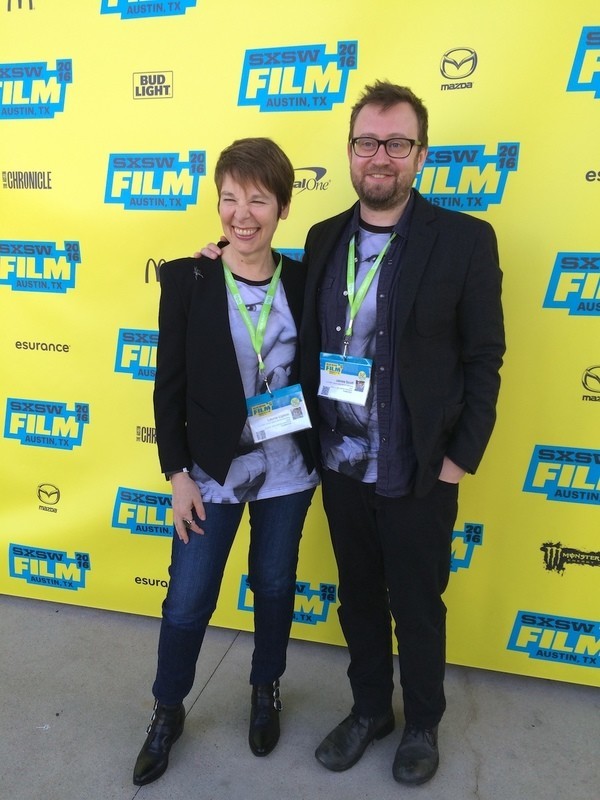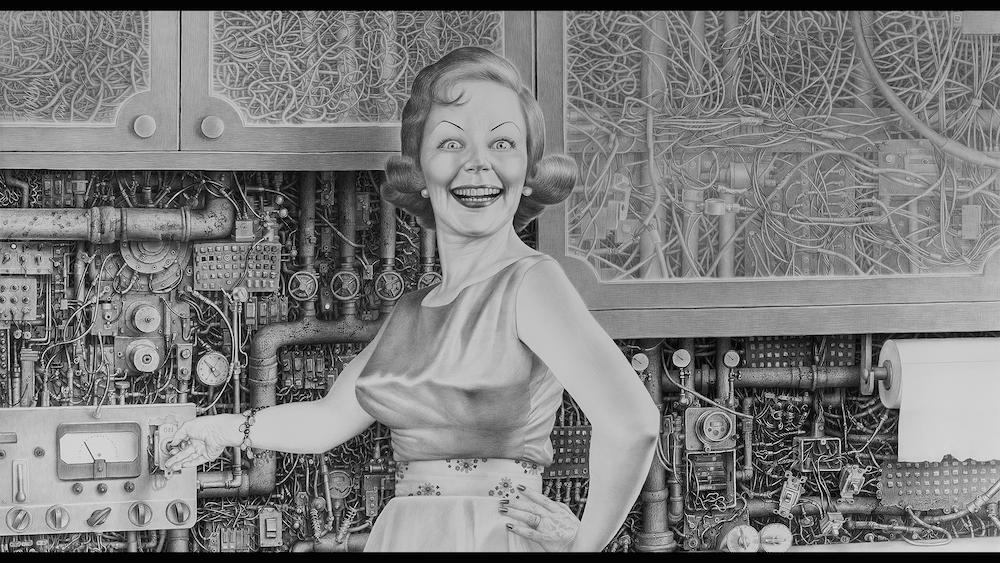I’m no art collector and have cursory knowledge on the subject, but if I could have any work of art on my wall, I would probably choose a Lipton. Who or what is a Lipton, you ask? Laurie Lipton is a Los Angeles-based artist who creates large-scale, immaculate pencil drawings. That’s it. Just a pencil. What she does with that pencil is bring to life the most grotesque side of human nature, our obsession with consumerism, technological terrors, and the unthinkable images that lurk within our subconscious. Her art has to be seen to be believed.
James Scott’s 34-minute documentary “Love Bite: Laurie Lipton and her Disturbing Black and White Drawings” gives the viewer a thorough look at Lipton’s work and her past experiences that brought this staggering artwork to life. “I draw. That’s what I do,” she says. She grew up in the suburbs with bohemian parents who supported and encouraged her imagination, but a horrific event from her past may have led her to create some of her more disturbing images. Today, she lives in LA and keeps at it. One has to wonder how her work has developed in the last few years since the making of this film. The way I see it, we are certainly living in a Lipton drawing right now.
Scott thankfully lets the viewer gaze upon Lipton’s work as we would in a museum and the movie, as a short, earns its running time. I always wanted to see more. The drawing she works on in the film itself is a subject worthy of its own feature-length documentary, a vast, sprawling illustration of a technological monster with video screens of blank, expressionless human faces. It looks like someone’s entire life’s work on that canvas.
Her work shares a kinship with Terry Gilliam. Surrealist, absurdist, satirical and always in tune with the dark corners of the soul. It’s no wonder Gilliam appears in the film and reminds the viewer about the snobbery and the over-elevated status art has in the art world when one gets into the subject of money. I would hope that Lipton’s work is on display with great appreciation somewhere and not locked in a basement waiting for the highest bidder. I could probably never afford one and it would take a lot of convincing for my girlfriend to allow me to hang one of her confrontational pieces prominently in our apartment, but I’m thankful this documentary introduced me to her work.
If you can’t afford a Lipton either, make sure you watch this on the biggest screen you have, try to hit the pause button once in a while and just stare.

Q&A with Laurie Lipton and James Scott
How did this film come about?
JAMES SCOTT: I discovered Laurie’s work completely by chance. A book of her drawings found me and the first images of her work that I saw had me totally mesmerized. It was a “religious” experience seeing them. There was something so hauntingly universal about the drawings and after fully realizing the insane level of detail needed to create them, I knew I had to contact her. She let me into her world and thus began our four years of filming.
Was it hard to stick to the short form? It seems like every drawing could have a documentary of its own.
JS: Each one of her drawings tells a story, and when you see them in person, you can spend half an hour in front of one and still miss the whole picture. Hidden away in the detail are dozens of little jokes, treasures and sub-stories, and Editing the film was very difficult, attempting to show 50 years of her work while at the same time just wanting to sit with the drawings for a minute. There was never enough time! But I hope that after people see the film they’ll seek out her work and see them in person where they can truly be appreciated in all their extraordinary detail.
You waited until the end to explore Lipton’s trauma. Was that a difficult editing choice?
JS: Not at all. In fact that last shot in the film is literally the final moment I filmed. I turned the camera off after that and filmed no more. It took Laurie four years of friendship to tell me the whole story, and it was clear to me that I didn’t want the film nor her life story to be contextualized completely around this one traumatic event. We are all a product of our experiences, good or bad, and it’s about what you do with that knowledge.
What’s next for you, James?
JS: I’m in the midst of editing a feature-length documentary next about a brother and sister fighting on opposite sides of the Libyan Revolution, which will be complete by the end of this year.

Why did you think the drawing in the film was going to be your last one? Do you often feel that way when creating a new piece?
LAURIE LIPTON: I don’t know what you’re referring to. Maybe the large piece I had finished & was schlepping into the other room? It was my last large drawing for a while because the larger drawings are harder to sell. Needless to say: I started another large one almost immediately afterwards. I never learn.
What keeps you going?
LL: Bliss. I am in bliss. I used to have to go to school, play with the other children, waitress, etc., etc., … and now I can just draw all day, every day. Imagine if you were a chocoholic and got locked in an exclusive, five star chocolate shop and couldn’t get out. That is what my life is like at the moment: I am alone with my passion, unsupervised.
Did you find it difficult to open up on camera about some of your past experiences?
LL: As my relationship with the director, Jim Scott, developed it became easier to open up. I had never discussed some of the things that are in the film … NEVER … not even with my family or closest friends. Jim made it possible by being sympathetic, understanding, & allowing our relationship to evolve. I eventually felt safe enough to be brutally honest. I trusted Jim totally. He is a kind, generous man and, in my humble opinion, an astounding documentary film maker. I was very fortunate.
Can you tell me anything about what you’re working on right now, if anything?
LL: I am working on a show called, “POST TRUTH,” about socializing alone in rooms and hiding behind screens on social media. After the election of Trump it became clearer to me how easily people are being manipulated. We’re addicted to technology, jacked into the system, without any concern about who is in control. There are no facts, only beliefs, and our beliefs are easily swayed. This is a very strange time and I hope that my artwork can capture it.












